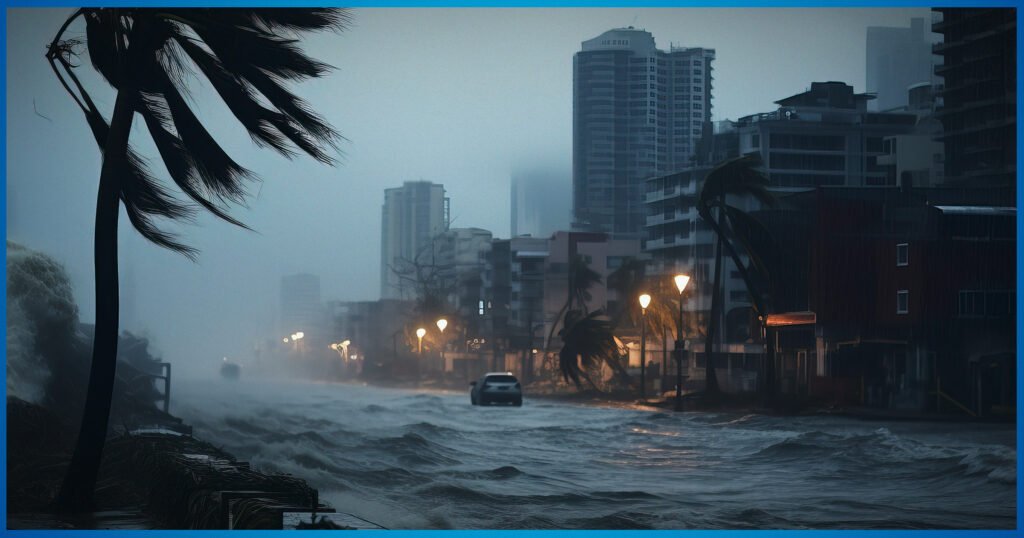

Many Americans appear to have another financial risk to worry about: The negative effect that extreme weather could have on their financial future. This is according to the 2024 Annual Retirement Study from Allianz Life.
In the survey, more than half (56%) of Americans said they have anxiety about rising costs, financial losses or even the health effects from extreme weather events or natural disasters. Millennials are more likely to have this worry than Generation X or baby boomers. More Hispanic respondents reported a higher anxiety level than Asian, Black and white respondents.
“We see extreme weather almost daily in the news,” said Lorinda Niemeyer, Allianz Life head of sustainability. “As natural disasters become more frequent, more intense and more costly, Americans are waking up to how this could pose a risk to their retirement nest egg. It’s not just the recovery costs after a disaster strikes. For many, extreme weather is increasing daily costs of living, insurance costs and other ongoing expenses. And those costs are tough to absorb if we don’t plan for them.”
Additional survey findings about extreme weather
The survey also noted that one in four Americans (25%) ranked the risks of rising costs, loss of insurance or damages due to weather or natural disasters as one of the top three risks to their retirement income. This was the same or higher than concerns such as taxes, debt or caregiving responsibilities. Yet only 10% who have concerns about weather have discussed these concerns with a financial professional.
At the same time, 82% said that creating a plan to mitigate or cover the financial implication of external events, such as extreme weather or natural disasters, would help ensure that they could financially support all the things they want to do in life. “Extreme weather has the potential to erode wealth just like other risks to a retirement strategy like inflation and increasing medical costs,” Niemeyer added. “A financial professional can help create a holistic retirement strategy that addresses the financial costs and risks of extreme weather to help protect your financial well-being and overall lifestyle.”
Those financially affected more likely to have a written financial plan
Americans who have been financially impacted by extreme weather are more likely than others to have a written financial plan and strategy to protect themselves from risks in the future, the survey said. Nearly half of Americans (48%) who have not been financially impacted by extreme weather do not have a written financial plan. Meanwhile, only 14% of those who have experienced extreme weather said the same. This group is making plans to protect themselves against this risk in the future.
More than one in three (36%) of those who have been financially impacted by extreme weather said that they have included the potential implications of extreme weather or natural disasters into their financial retirement plan, and only 12% who have not experienced this said the same.
“Americans who have experienced extreme weather and its effect on their finances have learned a hard lesson and now want to make sure they are financially prepared for another natural disaster to strike and protect themselves against this risk in the future,” added Niemeyer. “This can serve as an important lesson for others, too.”
Other negative effects of extreme weather
What are some of the other financial risks posed by extreme weather on consumers’ retirement savings? The rising costs associated with extreme weather is another risk that could erode retirement savings more quickly than anticipated, Niemeyer explained.
“It doesn’t matter if you are hit directly by extreme weather – it could still cost you. Even without experiencing a natural disaster, you will likely have to pay ongoing rising costs for insurance, taxes and housing upgrades. Then, if you are hit by extreme weather, you may need to pay for evacuation and recovery costs, and your property value may be reduced. If you haven’t prepared properly for the rising costs associated with extreme weather, this can rain on your retirement. The emotional and health toll resulting from this can impact the quality of your carefully planned and saved for retirement,” she said.
And why is extreme weather becoming more and more of an issue for retirement savers? Niemeyer explained that data is showing that natural disasters are becoming more frequent, more intense, and more costly. There were 28 billion-dollar disasters in 2023, according to the National Centers for Environmental Information.
“For anyone,” Niemeyer added, “the rising costs associated with extreme weather can be a burden. But, for retirees, the rising costs can have an even greater impact. While those who are still in the workforce have new income to help pay for these costs, retirees will have to turn to their nest egg to cover these increasing expenses. What’s more – many typical retiree destinations, such as Florida, can be particularly exposed to extreme weather.”
Creating a retirement strategy that addresses clients’ financial costs and risks
Financial professionals can help their clients prepare for extreme weather by using ways that are similar to those employed to address the risk of inflation and rising health-care costs, said Niemeyer.
“This means having a plan that includes risk management strategies,” she added. “While the risk of extreme weather can affect all Americans, its effects will likely vary depending on where they live. There are tools available to help you understand rising insurance costs and other aspects of this risk. A financial professional can help clients understand the financial risk and build a financial readiness plan that addresses this risk, with a holistic, long-term strategy.”
Allianz Life conducted the 2024 Annual Retirement Study online survey in February and March of 2024 with a nationally representative sample of 1,000 individuals age 25+ in the contiguous U.S. with an annual household income of $50k+ (single) / $75k+ (married/partnered) or with investable assets of $150k+. The study included an oversample of respondents who identified themselves as Black/African American (416 responses); Hispanic (398 responses); and Asian/Asian American (366 responses).



